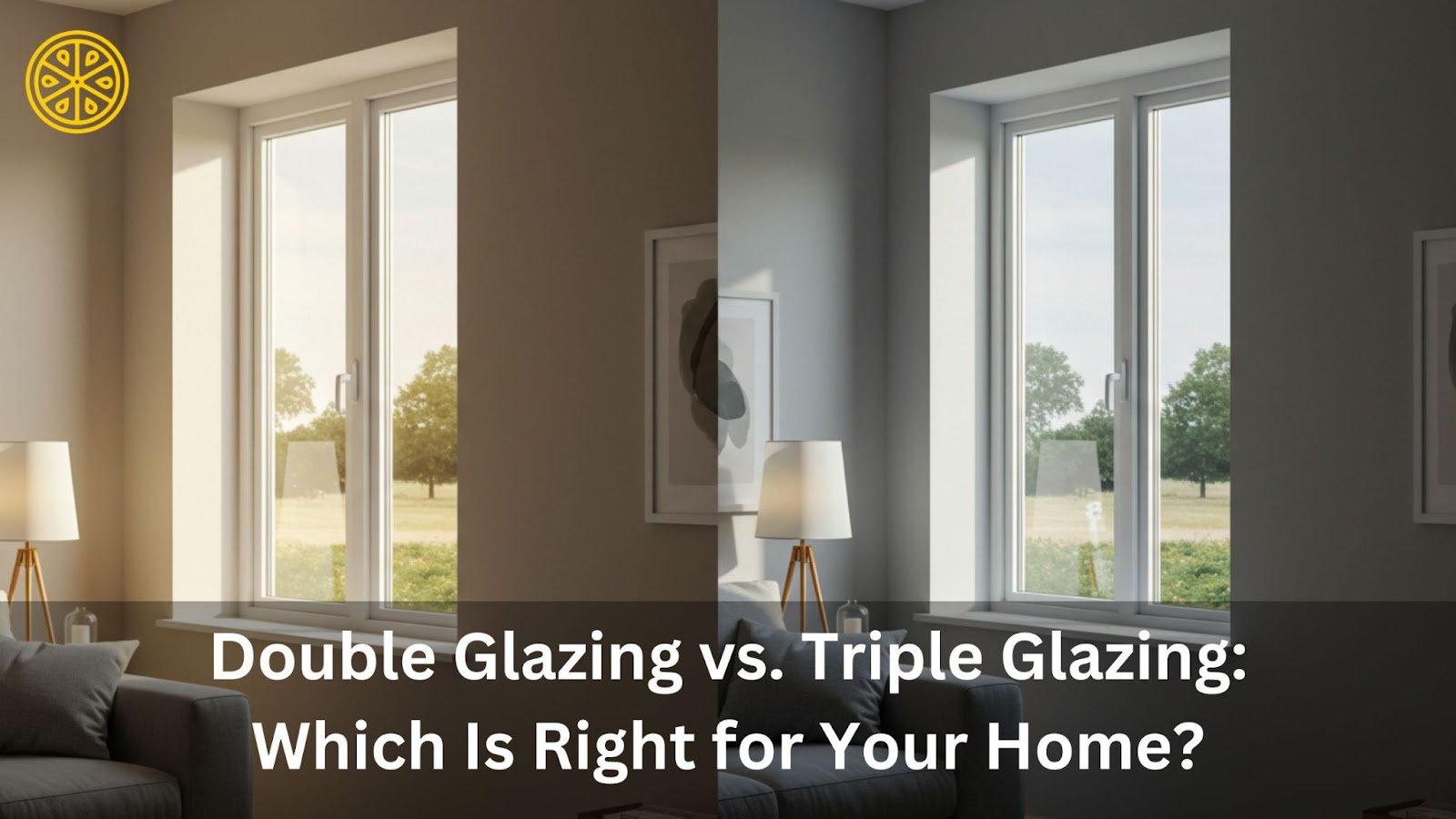When considering upgrading your windows, one of the first questions you may ask yourself is whether double glazing or triple glazing is the better option for your home. The decision isn’t always easy, and it often depends on several factors, including budget, climate, and the specific needs of your household.
Before making your choice, it’s important to understand the key differences between these two types of windows and what benefits each offers. If you’re looking to install either type of glazing, it may be helpful to start by checking if your installer offers a double glazing certificate to ensure the windows meet industry standards.
What Are Double and Triple Glazing, and How Do They Work?
Let’s start with the basics. Double glazing involves two panes of glass with a gap between them, usually filled with air or an insulating gas like argon. This design helps to reduce heat transfer, keeping your home warmer in the winter and cooler in the summer.
Triple glazing, as the name suggests, involves three panes of glass, with two insulating gaps between them. This extra layer of glass provides more insulation, which can result in even greater energy efficiency. But with that extra layer comes higher costs. Now, let’s delve into what these types of windows offer and whether they’re right for your home.
How Do Double and Triple Glazing Benefit Your Home?
Both double and triple glazing offer substantial benefits for homeowners, especially when it comes to energy efficiency. Installing these windows can drastically reduce your heating and cooling bills, improving comfort year-round. So, why should you consider one over the other?
Double Glazing: What Are the Benefits?
Double glazing is the more affordable of the two options, and it’s a popular choice for homes across the UK. Here are the main benefits:
- Improved Insulation: Double glazing significantly improves thermal insulation. The gap between the two panes of glass creates a barrier that helps to trap heat inside your home, reducing the need for heating during the colder months.
- Noise Reduction: Double-glazed windows can help reduce the amount of noise coming from the outside. If you live near a busy street or in a noisy area, you’ll likely notice a quieter environment.
- Energy Efficiency: Double glazing is more energy-efficient than single-glazed windows. In fact, they can reduce heat loss by up to 50%, which translates into lower energy bills.
- Cost-Effective: Compared to triple glazing, double-glazed windows are more affordable, both in terms of initial cost and installation.
Triple Glazing: What Are the Benefits?
Triple glazing is a more recent development in window technology, and although it’s typically more expensive, it offers several advantages over double glazing:
- Superior Insulation: Triple-glazed windows provide even better insulation than double glazing. The extra pane and additional air gap between the layers further reduce heat transfer, keeping your home even more energy-efficient.
- Better Soundproofing: With an extra layer of glass and insulation, triple glazing can offer even more noise reduction, making it ideal for homes in noisy areas or near busy roads.
- Improved Security: Triple glazing is more difficult to break than double glazing. The added layers make it harder for intruders to gain access to your home, providing an added layer of security.
- Long-Term Savings: While triple glazing has a higher upfront cost, its superior insulation means that it can lead to greater savings in energy bills over the long term.
When Should You Choose Double Glazing?
Double glazing is an excellent option for most homes, offering a good balance of performance and cost. It’s perfect for homeowners who want to improve their home’s energy efficiency without spending a fortune. Some situations where double glazing is ideal include:
- Mild to Moderate Climates: If you live in a climate that doesn’t experience extreme temperature fluctuations, double glazing will likely provide the energy efficiency you need without the extra cost of triple glazing.
- Budget-Friendly Options: If you’re on a budget but still want to enhance your home’s insulation, double glazing is a great choice. It offers a good level of thermal and sound insulation at a more affordable price point.
- Standard Homes: For most residential properties, double glazing provides more than enough insulation. Unless you live in a particularly cold or noisy area, double glazing is a sufficient option for maintaining comfort.
When Should You Choose Triple Glazing?
While triple glazing is more expensive, it may be the right choice for certain homes, particularly those in areas with extreme weather conditions or high levels of noise. Here are a few scenarios where triple glazing might be the better option:
- Extreme Climates: If you live in an area that experiences very cold winters or hot summers, triple glazing can provide superior insulation. It helps to trap more heat inside during the winter and keeps your home cooler in the summer, resulting in greater energy savings.
- Noisy Environments: If you live near a busy road, airport, or railway, the additional layers in triple-glazed windows can provide better soundproofing. This can make a huge difference in your home’s comfort, especially if you struggle with excessive external noise.
- Long-Term Investment: Although triple glazing comes with a higher initial price tag, it can be a better long-term investment, especially if you plan to stay in your home for many years. Over time, the savings on energy bills can offset the higher upfront cost.
How Much Do Double and Triple Glazing Cost?
The cost of double and triple glazing varies depending on several factors, including window size, material, and installation complexity. However, on average, you can expect to pay:
- Double Glazing: The average cost of installing double glazing in a standard home is between £300 and £500 per window, depending on the size and material.
- Triple Glazing: Triple glazing typically costs between £600 and £1,000 per window. The price difference between double and triple glazing can add up quickly, especially if you need to replace many windows in your home.
While triple glazing offers superior performance, the additional cost may not always be justified, especially if you live in a more moderate climate or in a less noisy area.
How to Make Your Final Decision: Double or Triple Glazing?
When deciding between double and triple glazing, it’s important to weigh the benefits against the costs. Here are a few tips to help you make the right choice:
- Consider Your Climate: If you live in a region with harsh winters or extreme temperatures, triple glazing may provide better insulation. However, if your climate is milder, double glazing may suffice.
- Assess Your Budget: Triple glazing can be more expensive, both in terms of material and installation costs. If you’re on a tight budget, double glazing may offer the best balance of cost and performance.
- Think About Long-Term Savings: While triple glazing is more expensive upfront, it may save you more on energy bills in the long run, making it a more cost-effective option over time.
- Evaluate Noise Levels: If you live in a noisy area, triple glazing can provide more soundproofing. If noise reduction isn’t a major concern, double glazing will likely be enough.
Conclusion
The choice between double and triple glazing depends on your specific needs, budget, and the environment in which you live. Double glazing is an affordable, effective option for most homes, while triple glazing offers superior insulation and noise reduction for those in extreme climates or noisy areas.
If you’re considering new windows for your home, it’s a good idea to check whether the installation team provides a double glazing certificate, which ensures that the windows meet industry standards. By weighing the pros and cons of each option, you can make an informed decision that will improve your home’s energy efficiency, comfort, and value.











